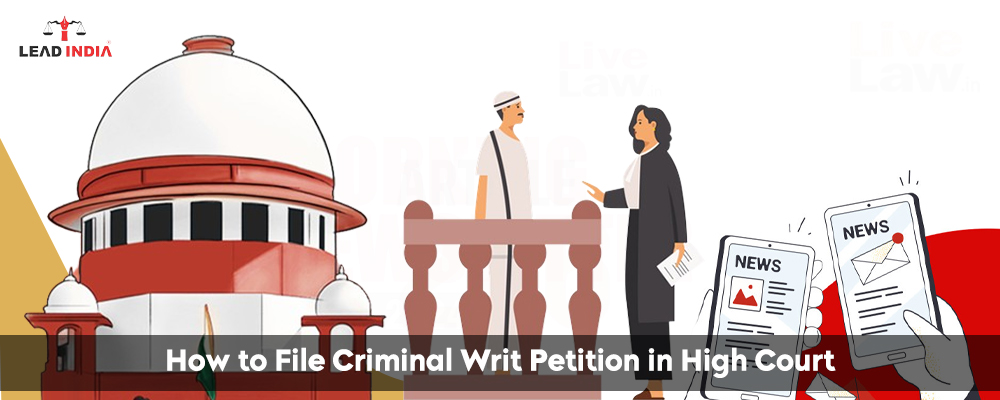High Courts have the authority to grant directions, orders, or writs, including prohibitions, quo warranto, certiorari, mandamus, and habeas corpus writs, to any person or authority, including the Government in appropriate cases, within the territories over which they have jurisdiction. These writs may be used to enforce any of the rights guaranteed by the Indian Constitution.
Need A Legal Advice
The internet is not a lawyer and neither are you. Talk to a real lawyer about your legal issue

Criminal Writ Petition: About
- In situations where someone’s fundamental rights have been infringed or violated or when a public authority has misused its power, a criminal writ petition is filed.
- It can be used to pursue legal action for violations of the law or fundamental rights.
- To enforce an accused person’s rights or to address any other criminal law-related issue, such as an arrest, release on bond, anticipatory bail, pleas, discovery, pre-trial hearings, trials, charge arguments, evidence, motions, and violent incidents during detention, one may file a criminal writ petition.
Who can File a Criminal Writ Petition in the High Court?
- When the State violates someone’s fundamental rights, they can file a Criminal writ petition in the High Court, but when the State violates some other rights, they can file a writ petition in the High Court.
When is it Possible to File a Criminal Writ Petition in High Court?
- Our Constitution does not specify how long after the emergence of the cause of action a Criminal Writ Petition must be filed in the High Court.
- This becomes even more crucial because Petitions under Articles 32 and 226 of the Constitution are exempt from the Limitation Act.
Grounds to File a Criminal Writ Petition in High Court
The grounds to file a criminal writ petition in High Court are:
- Compensation Regarding Deaths in police custody (custodial death): Seeking justice for lives lost due to negligence or abuse within custodial environments.
- Compensation Regarding Large-Scale Catastrophes and Riots: Pursuing recompense for losses incurred during widespread disasters or civil unrest.
- Compensation for Torts: Advocating for restitution in cases of civil wrongs or harm caused by individuals or entities.
- Preventive Detention: Challenging the legality of detention measures taken to prevent future criminal activity.
- Externment: Addressing the legality and fairness of orders to remove individuals from specific areas.
- History Sheet: Contesting the accuracy or misuse of documented personal histories maintained by authorities.
- Corruption: Holding accountable those engaged in corrupt practices that undermine justice and integrity.
- C.B.I. Matters: Seeking legal intervention and investigation by the Central Bureau of Investigation into specific cases.
- Other Compensation Matters: Addressing diverse legal issues where compensation is sought for various grievances.
Procedure to File a Criminal Writ Petition in High Court
- Choose the Right Court(Jurisduction): Writ petitions may be filed in the High Court of India, based on the relief being sought and the circumstances of the case.
- Get the Writ Petition Ready: The petition must be submitted in writing and must include a justification for the request for relief.
- Gather Corroborating Documentation: Compile any additional supporting documentation, such as copies of pertinent laws, rules, or orders, and prepare an affidavit in support of the petition.
- File in the Petition: Following the guidelines and procedures set forth by the court, submit the petition, the affidavit, and the supporting documentation to the relevant court.
- Cover the Filing process Fee: When the court orders it, pay the specified filling Process fee.
- Serve the Respondent: The party the petition is filed against is the respondent. A copy of the petition should be served to them.
- Admissibility: If the court determines that there are enough reasons to grant relief, it may grant the petition for a hearing.
- Hearing: After considering the petition, the court will determine whether to provide the requested relief.
In the case of Sonu v The State of Haryana and Others (2021), the court denied the petitioner’s request for certiorari under Articles 226 and 227 of the Indian Constitution, ruling that the current criminal writ case is dismissed as deemed infructuous due to the petitioner’s sister’s previous marriage.
Particular preparation, planning, and adherence to legal procedures are required when filing a criminal writ petition in a High Court. To make certain that the petition is correctly prepared and filed, you must seek the aid of educated legal experts. People can effectively use the system of law to seek justice for rights violations or unfair practices by following the above-described procedures.
For any type of legal assistance, one can talk to lawyer from Lead India. Lead India provides free online legal advice in India. With Lead India, one can ask free online questions of the experts in addition to getting free legal advice.





 Talk to a Lawyer
Talk to a Lawyer